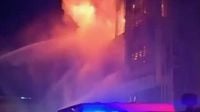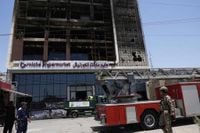In the early hours following a devastating fire at the Corniche Hypermarket in Kut, eastern Iraq, officials and residents grappled with the grim aftermath of a tragedy that claimed the lives of more than 60 people, including children. The five-story shopping center, which had only opened its doors a week prior, was engulfed in flames late Wednesday, July 16, 2025, in an area selling perfume and cosmetics on the second floor. Despite the efforts of civil defense teams who managed to rescue 45 people trapped inside, the fire's toll was catastrophic.
As of Friday, July 18, 2025, authorities were still struggling to identify 18 of the victims whose bodies were severely burned, requiring DNA testing. The final death toll was confirmed at 63, with many victims found trapped on the upper floors, succumbing primarily to suffocation caused by heavy smoke. The Iraqi Interior Ministry reported that most of those who died were inside bathrooms, highlighting the desperate conditions as the fire spread rapidly through the building.
Provincial Governor Mohammed al-Miyahi declared three days of mourning in Wasit province and underscored the gravity of the incident during a press conference. He revealed that the son of the shopping center owner and other family members were among the victims, bringing a personal dimension to the tragedy. Legal complaints have been filed against the building and shopping center owners, who have yet to comment. Al-Miyahi stressed, "We assure the families of the innocent victims that we will not be lenient with those who were directly or indirectly responsible for this incident." The governor also alleged that the building owner had failed to implement required fire safety measures and had not obtained necessary permits when converting the structure into a shopping center.
The Corniche Hypermarket was a five-story complex housing restaurants, shops, and a supermarket. Its rapid destruction and the high death toll have raised serious questions about building safety standards in Iraq, a country where such tragedies have, unfortunately, become a recurring nightmare. Residents and local officials alike have pointed to the lack of fire safety protocols, including emergency exits and fire protection systems, as a key factor that turned the fire into a deadly inferno.
Local resident Abdul Redha Thahab, 60, shared his heartbreak, recounting the loss of a family of six who lived next door to him: "My friend and neighbor's family, who lived right next to my house -- a family of six, the husband, his wife, their two daughters, and two young children -- all perished in the fire." Thahab also noted that the building lacked emergency exit stairways, and that neighborhood residents had to assist firefighters due to a shortage of fire trucks, highlighting systemic shortcomings in emergency preparedness.
Similarly, Imad al-Quraishi, attending a funeral procession in Najaf for a relative who died in the blaze, criticized the authorities: "No emergency exits, no fire extinguisher, no care, nothing," he said. "If the authorities in the area have any honor, they will submit their resignation today." Such sentiments echo widespread frustration over the government’s failure to enforce safety regulations effectively.
The Interior Ministry, led by Minister Abdul Amir Al-Shammari, has formed a supreme investigation committee tasked with probing the cause of the fire and identifying any negligence or shortcomings. The ministry promised transparency and accountability, vowing to hold anyone responsible to account and to publish the investigation results promptly. Meanwhile, the provincial council of Wasit has suspended the directors of Kut municipality and occupational safety pending the investigation, and formed committees to conduct comprehensive building safety inspections.
This tragic fire is not an isolated incident. Iraq has witnessed several deadly fires in recent years, often linked to poor building standards and lax enforcement of safety codes. In July 2021, a hospital fire in Nasiriyah killed between 60 and 92 people, fueled by illegal, highly flammable sandwich panel cladding used in construction. More recently, in 2023, a wedding hall fire in Hamdaniya, Nineveh province, claimed over 100 lives after ceiling panels ignited near pyrotechnic equipment.
These disasters underscore a disturbing pattern of neglect and insufficient regulatory oversight that continues to cost lives. The Corniche Hypermarket blaze has reignited calls for urgent reforms to ensure that buildings comply with fire safety standards and that emergency services are adequately equipped and staffed to respond effectively.
As the community mourns the loss of so many, including entire families, the investigation into the fire’s cause and the accountability of those responsible remains a critical focus. The government's response, including legal actions and safety inspections, will be closely watched as Iraq confronts the painful reality of preventable tragedies.
For now, the charred remains of the Corniche Hypermarket stand as a stark reminder of the cost of neglecting safety and the urgent need for change in Iraq’s building and fire safety practices.





